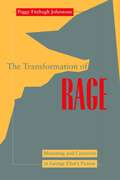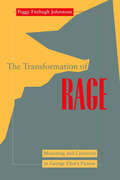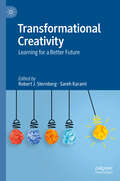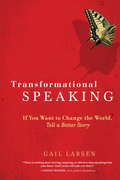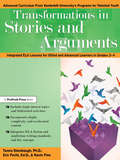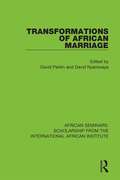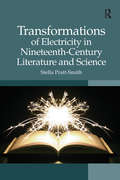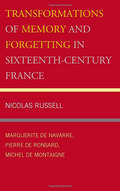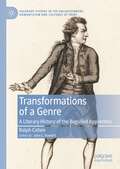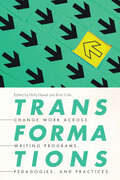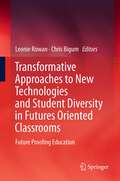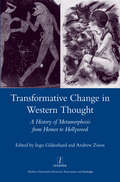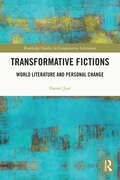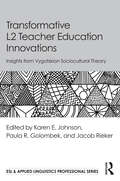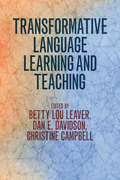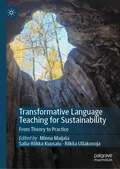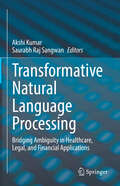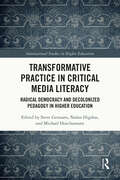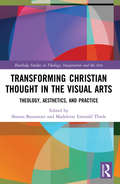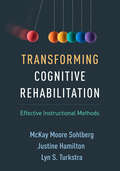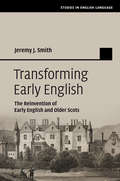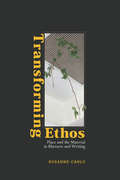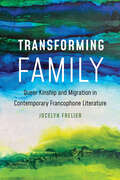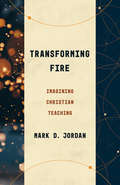- Table View
- List View
Transformation of Rage: Mourning and Creativity in George Eliot's Fiction
by Peggy Fitzhugh JohnstoneGeorge Eliot has been widely praised both for the richness of her prose and the universality of her themes. In this compelling study, Peggy Fitzhugh Johnstone goes beyond these traditional foci to examine the role of aggression in Eliot's fiction and to find its source in the author's unconscious sense of loss stemming from traumatic family separations and deaths during her childhood and adolescence. Johnstone demonstrates that Eliot's creative work was a constructive response to her sense of loss and that the repeating patterns in her novels reflect the process of release from her state of mourning for lost loved ones.
Transformation of Rage: Mourning and Creativity in George Eliot's Fiction (Open Access Lib And Hc Ser. #9)
by Peggy Fitzhugh JohnstoneGeorge Eliot has been widely praised both for the richness of her prose and the universality of her themes. In this compelling study, Peggy Fitzhugh Johnstone goes beyond these traditional foci to examine the role of aggression in Eliot's fiction and to find its source in the author's unconscious sense of loss stemming from traumatic family separations and deaths during her childhood and adolescence. Johnstone demonstrates that Eliot's creative work was a constructive response to her sense of loss and that the repeating patterns in her novels reflect the process of release from her state of mourning for lost loved ones.
Transformational Creativity: Learning for a Better Future
by Robert J. Sternberg Sareh KaramiThis edited volume brings together leading scholars in diverse disciplines to share their best thinking on how creativity can be conceived of, taught for, and deployed to serve rather than undermine humanity. Transformational creativity, as defined in this book, is creativity deployed to make a positive, meaningful, and potentially enduring difference to the world. Transformational creativity is compared to transactional creativity, which is creativity deployed in search of a reward, whether externally or internally generated.
Transformational Speaking: If You Want to Change the World, Tell a Better Story
by Gail LarsenYou can change the world--one audience at a time! Today's challenging times call for passionate visionaries who are authentic and articulate communicators. Speaking coach and consultant Gail Larsen presents a proven program that liberates the "speaker within" and transforms even the reluctant orator into an agent of change. While most books on public speaking focus on polishing your presentation and overcoming fear, Larsen's holistic blend of spirit and logic goes far beyond the standard format, making TRANSFORMATIONAL SPEAKING a must-read for even the most seasoned speechmakers. With her uniquely inspirational approach, Larsen reaches out to those who want to make a genuine difference in our world by changing minds through touching hearts. TRANSFORMATIONAL SPEAKING offers insightful advice on everything from defining your message and refining your delivery, to managing the dynamics of a room, handling logistics like a pro, and building a connection with an audience of any size. Larsen has helped business executives and entrepreneurs, community and social change leaders, and healers and life coaches become active movers and shakers through the power of effective communication.
Transformations in Stories and Arguments: Integrated ELA Lessons for Gifted and Advanced Learners in Grades 2-4
by Tamra Stambaugh Eric Fecht Kevin FinnTransformations in Stories and Arguments explores essential questions, such as "How does the development of a character build the reader's understanding? How do the actions of others change the world? How do words and images impact our thinking?" This unit, developed by Vanderbilt University's Programs for Talented Youth, is aligned to the Common Core State Standards and features accelerated content, creative products, differentiated tasks, engaging activities, and the use of in-depth analysis models to develop sophisticated skills in the language arts. Through the lens of transformation, students will examine narrative and persuasive elements essential to the analysis of short stories, advertisements, visual art, scientific argumentation, and their own writing. Students will discover transformations in themselves and their written work as they craft and revise narrative and persuasive pieces, realizing their own voice in the process. Ideal for gifted classrooms or gifted pull-out groups, the unit features stories by Dan Santat, Fiona Roberton, Jannell Cannon, Christopher Myers, Maurice Sendak, Daniel Manus Pinkwater, Jane Yolen, and Patricia Polacco; poetry by Carl Sandburg; sculptures by Arturo Di Modica and Kristen Visbal; a viewing of Pixar's short film Lou and a variety of commercials; and engaging short nonfiction readings.Winner of the 2015 NAGC Curriculum Studies AwardGrades 2-4
Transformations of African Marriage (African Seminars: Scholarship from the International African Institute #6)
by David Parkin David NyamwayaOriginally published in 1987, this book shows that there is still considerable continuity in the practices and ideas of marriage in Afican against a background of social and economic change. This book discusses the diverse marriage forms in Africa and explores the different systems some of which can be understood in terms of Levi-Strauss's distinciton between complex and semi-complex structures, while others throw up questions of filiation, child custoidanship and rights secured through bridewealth transactions.
Transformations of Electricity in Nineteenth-Century Literature and Science
by Stella Pratt-SmithThroughout the nineteenth century, practitioners of science, writers of fiction and journalists wrote about electricity in ways that defied epistemological and disciplinary boundaries. Revealing electricity as a site for intense and imaginative Victorian speculation, Stella Pratt-Smith traces the synthesis of nineteenth-century electricity made possible by the powerful combination of science, literature and the popular imagination. With electricity resisting clear description, even by those such as Michael Faraday and James Clerk Maxwell who knew it best, Pratt-Smith argues that electricity was both metaphorically suggestive and open to imaginative speculation. Her book engages with Victorian scientific texts, popular and specialist periodicals and the work of leading midcentury novelists, including Charles Dickens, Charlotte Bronte, Emily Bronte, William Makepeace Thackeray and Wilkie Collins. Examining the work of William Harrison Ainsworth and Edward Bulwer-Lytton, Pratt-Smith explores how Victorian novelists attributed magical qualities to electricity, imbuing it with both the romance of the past and the thrill of the future. She concludes with a case study of Benjamin Lumley’s Another World, which presents an enticing fantasy of electricity’s potential based on contemporary developments. Ultimately, her book contends that writing and reading about electricity appropriated and expanded its imaginative scope, transformed its factual origins and applications and contravened the bounds of literary genres and disciplinary constraints.
Transformations of Memory and Forgetting in Sixteenth-Century France: Marguerite de Navarre, Pierre de Ronsard, Michel de Montaigne
by Nicolas RussellThis book proposes that in a number of French Renaissance texts, produced in varying contexts and genres, we observe a shift in thinking about memory and forgetting. Focusing on a corpus of texts by Marguerite de Navarre, Pierre de Ronsard, and Michel de Montaigne, it explores several parallel transformations of and challenges to traditional discourses on the human faculty of memory. Throughout Classical Antiquity and the Middle Ages, a number of influential authors described memory as a powerful tool used to engage important human concerns such as spirituality, knowledge, politics, and ethics. This tradition had great esteem for memory and made great efforts to cultivate it in their pedagogical programs. In the early sixteenth century, this attitude toward memory started to be widely questioned. The invention of the printing press and the early stages of the scientific revolution changed the intellectual landscape in ways that would make memory less important in intellectual endeavors. Sixteenth-century writers began to question the reliability and stability of memory. They became wary of this mental faculty, which they portrayed as stubbornly independent, mysterious, unruly, and uncontrollable–an attitude that became the norm in modern Western thought as is illustrated by the works of Descartes, Locke, Freud, Proust, Foucault, and Nora, for example. Writing in this new intellectual landscape, Marguerite de Navarre, Ronsard, and Montaigne describe memory not as a powerful tool of the intellect but rather as an uncontrollable mental faculty that mirrored the uncertainty of human life. Their characterization of memory emerges from an engagement with a number of traditional ideas about memory. Notwithstanding the great many differences in concerns of these writers and in the nature of their texts, they react against or transform their classical and medieval models in similar ways. They focus on memory’s unruly side, the ways that memory functions independently of the will. They associate memory with the fluctuations of the body (the organic soul) rather than the stability of the mind (the intellectual soul). In their descriptions of memory, these authors both reflect and contribute to a modern understanding of and attitude towards this mental faculty. Published by University of Delaware Press. Distributed worldwide by Rutgers University Press.
Transformations of a Genre: A Literary History of the Beguiled Apprentice (Palgrave Studies in the Enlightenment, Romanticism and Cultures of Print)
by Ralph CohenThe aim of this book is to orchestrate “a generic reconstitution of literary studies” based on a comprehensive theory of genre and generic transformation. Taking “An Excellent Ballad of George Barnwel,” a seventeenth-century broadside of sex and greed, Ralph Cohen analyzes the generic transformations—including Addison’s ballad criticism in The Spectator, The London Merchant, Percy’s ballad editing in Reliques, and Barnwell. A Novel—in which this particular ballad exhibits remarkable continuity over the next four centuries, culminating with his personal re-formation; what was considered non-literary criticism becomes literary. This unique literary history reconceives narrative as a component of genre rather than a genre itself, demonstrates the ineluctably mixed nature of genres and the literary nature of our humanness, and analyzes the shifting generic contexts for interpretation and gender relations. Incorporating theory consciousness into the literary genre he is regenerating, Cohen offers a brilliant example of how future literary histories might be written.
Transformations: Change Work across Writing Programs, Pedagogies, and Practices
by Holly Hassel Kirsti ColeAs teaching practices adapt to changing technologies, budgetary constraints, new student populations, and changing employment practices, writing programs remain full of people dedicated to helping students improve their writing. This edited volume offers strategies for implementing large- and small-scale changes in writing programs by focusing on transformations—the institutional, programmatic, curricular, and labor practices that work together to shape our teaching and learning experiences of writing and rhetoric in higher education. The collection includes chapters from multiple award-winning writing programs, including the recipients of the Two-Year College Association’s Outstanding Programs in English Award and the Conference on College Composition and Communication’s Writing Program Certificate of Excellence. These authors offer perspectives that demonstrate the deep work of transformation in writing programs and practices writ large, confirm the ways in which writing programs are connected to and situated within larger institutional and disciplinary contexts, and outline successful methods for navigating these contexts in order to transform the work. In using the prism of transformation as the organizing principle for the collection, Transformations offers a range of strategies for adapting writing programs so that they meet the needs of students and teachers in service of creating equitable, ethical literacy instruction in a range of postsecondary contexts. Contributors: Leah Anderst, Cynthia Baer, Ruth Benander, Mwangi Alex Chege, Jaclyn Fiscus-Cannaday, Joanne Giordano, Rachel Hall Buck, Sarah Henderson Lee, Allison Hutchinson, Lynee Lewis Gaillet, Jennifer Maloy, Neil Meyer, Susan Miller-Cochran, Ruth Osorio, Lori Ostergaard, Shyam Pandey, Cassie Phillips, Brenda Refaei, Heather Robinson, Shelley Rodrigo, Julia Romberger, Tiffany Rousculp, Megan Schoen, Paulette Stevenson
Transformative Approaches to New Technologies and Student Diversity in Futures Oriented Classrooms
by Leonie Rowan Chris BigumIn this book we outline an optimistic, aspirational and unashamedly ambitious agenda for schooling. We make cautious use of the concept of 'future proofing' to signal the commitment of the various authors to re-thinking the purposes, content and processes of schooling with a view to ensuring that all children, from all backgrounds are prepared by their education to make a positive contribution to the futures that are ahead of them. The book focuses on issues relating to technology and social justice to re-examine the traditional relationship between schools and technology, between schools and diverse learners, and between schools, children and knowledge. Drawing from examples from around the world, the book explores practical ways that diverse schools have worked to celebrate diverse understandings of what it means to be a learner, a citizen, a worker in these changed and changing times and the ways different technologies can support this agenda.
Transformative Change in Western Thought: A History of Metamorphosis from Homer to Hollywood
by Ingo GildenhardThis groundbreaking volume maps the shifting place and function of marvelous transformations from antiquity to the present day. Shape-shifting, taking animal bodies, miracles, transubstantiation, alchemy, and mutation recur and echo throughout ancient and modern writing and thinking and continue in science fiction today as tales of gene-splicing and hybridisation. The idea of metamorphosis lies in uneasy coexistence with orderly world views and it is often cast out, or attributed to enemies. Augustine and the church fathers consider shape-shifting ungodly; Enlightenment thinkers suppress alchemy as unscientific; genetically-modified wheat and stem-cell research are stigmatised as unnatural. Yet the very possibility of radical transformation inspires hope just as it frightens. A provocative, theorising, trans-historical history, this book ranges across classics, literature, history, philosophy, theology and anthropology. From Homer and Ovid to Proust and H. P. Lovecraft and through figures from Proteus to Kafka's Fly and toSpiderman, four historical surveys are combined with nine case studies to show the malleable, yet persistent, presence of transformation throughout Western cultural history.
Transformative Fictions: World Literature and Personal Change (Routledge Studies in Comparative Literature)
by Daniel JustTransformative Fictions: World Literature and Personal Change engages with current debates in world literature over the past twenty years, addressing the nature of literary influence in centers and peripheries, the formation of transnational literary and pedagogical canons, and the role of translation and regionalism in how we relate to texts from around the globe. The author, Daniel Just, argues for a supranational but sub-global perspective of regions that emphasizes practical reasons for reading and focuses on the potential of literary texts to stimulate personal transformation in readers. One of the recurring dilemmas in these debates is the issue of delimitation of world literature. The trouble with the world as a frame of reference is that no single researcher is bound to have the in-depth knowledge and linguistic skills to discuss works from all countries. In response, this book revives literary theory and recasts it for the purposes of world literature, by making a case for the continuing relevance of literature in the age of new media. With the examples of fictional and nonfictional writings by Milan Kundera, Witold Gombrowicz and Bohumil Hrabal, Just shows that regional literatures offer differing methods of activating readers and thereby prompting personal change. This book would be of general interest to anyone who wants to explore personal change through literature but is particularly indispensable for literary professionals, researchers, and postgraduate and graduate students.
Transformative L2 Teacher Education Innovations: Insights from Vygotskian Sociocultural Theory (ESL & Applied Linguistics Professional Series)
by Karen E. Johnson Paula R. Golombek Jacob RiekerTransformative L2 Teacher Education Innovations features empirical research studies informed by Vygotskian Sociocultural Theory (VSCT) that are explicitly and intentionally designed to transform second language (L2) teacher reasoning and thinking, as well as L2 teaching practices and pedagogical choices.With contributions from scholars and practicing teacher educators, each chapter highlights a designed innovative professional development experience that has created a “new” social situation of development with a clearly articulated “ideal” for L2 teachers to embrace and/or achieve. Each study articulates the rationale and unique design features of the innovation, the intentionality behind the choices made when designing and enacting the innovation, and the quality, character, and outcomes of the intervention for L2 teachers. Furthermore, each study documents the forms of mediation that are offered to support L2 teacher professional development, such as conceptual tools, goal-directed activities, and/or social relations/interactions.The book offers insight into the internal logic of VSCT-informed L2 Teacher Education and provides concrete examples of how L2 teacher educators can adopt a Vygotskian-informed pedagogical stance in their teacher education practices. The edited collection is especially applicable for scholars and teacher educators in language education, applied linguistics, TESOL, and bilingual education who engage with Vygotskian Sociocultural Theory.
Transformative Language Learning and Teaching
by Christine Campbell Betty Lou Leaver Dan E. DavidsonTransformative learning has been widely used in the field of adult education for over twenty years, but until recently has received little attention in the field of world languages. Drawing on best practices and the research of distinguished international world language experts, this volume provides theoretical and classroom-tested models of transformative education in world languages at major university, state and governmental programs. Chapters outline theoretical frameworks and detail successful models from cutting-edge programs in a wide range of languages, with plenty of examples included to make the theory accessible to readers not yet familiar with the concepts. Classroom teachers, program administrators and faculty developers at every level of instruction will find support for their courses. With its innovative approach to the teaching and learning of languages, this volume is a seminal text in transformative language learning that will stimulate discussions and innovation in the language field for years to come.
Transformative Language Teaching for Sustainability: From Theory to Practice
by Riikka Ullakonoja Minna Maijala Salla-Riikka KuusaluThis edited book is centred around the novel didactic model of Transformative Language Teaching for Sustainability. The contributing authors discuss the uses and possibilities of the model, as well as other sustainability-related aspects of language education, such as Education for Sustainable Development, transformative language teaching methods, and ecolinguistics. The book consists of a combination of theoretical review articles and practical research articles drawing on findings from a variety of contexts and educational settings. While there are many practical examples of pedagogical approaches and methods for transformative education for sustainability, this book presents a thorough framework based on academic research, designed to be useful to language teachers, teacher trainers, policy makers, and curriculum designers, as well as academics working in fields such as applied linguistics, language learning, language teaching, language education policy, environmental education, and sustainability education.
Transformative Natural Language Processing: Bridging Ambiguity in Healthcare, Legal, and Financial Applications
by Akshi Kumar Saurabh Raj SangwanThe evolving landscape of technology has presented numerous opportunities for addressing some of the most critical challenges in high-stakes domains such as medicine, law, and finance. These fields, where the stakes are exceptionally high, have increasingly turned to Natural Language Processing (NLP) to manage, interpret, and utilize vast amounts of unstructured linguistic data. The complexities and subtleties inherent in human language pose significant challenges in these sectors, where precision and clarity are paramount. Misinterpretation or ambiguity can lead to far-reaching consequences, making the need for advanced NLP techniques crucial. This book aims to bridge the gap between state-of-the-art NLP technologies and their practical applications in medicine, law, and finance. By focusing on the specific challenges and advancements within these sectors, the publication intends to highlight innovative approaches, methodologies, and technologies that are shaping the future of NLP. It discusses the integration of NLP with other technological advancements, the development of new tools and techniques, and the ethical considerations involved in deploying NLP solutions in high-stakes domains. Moreover, the book provides a platform for researchers, practitioners, and industry experts to share their experiences, insights, and research findings. Through comprehensive reviews, case studies, and empirical research, it covers a range of topics including but not limited to handling uncertainty in clinical notes, approaches for dealing with ambiguity in legal documents, sentiment analysis in financial markets, and ethical considerations in the use of NLP for sensitive data.
Transformative Practice in Critical Media Literacy: Radical Democracy and Decolonized Pedagogy in Higher Education (International Studies in Higher Education)
by Michael Hoechsmann Nolan Higdon Steve GennaroTransformative Practice in Critical Media Literacy brings together a diverse selection of essays to examine the knowledge production crisis in higher education and the role that news media and technology play in this process.This text highlights the importance of radical pedagogy and critical media literacy to fight back and reclaim higher education as the battleground for democracy and the embodiment of citizenship. Using a global and social justice lens, it explores the transformative potential of critical media literacy in higher education. It also provides real examples of current critical media literacy practices around the globe and of successful experiences inside classrooms. In an era of fake news, this text fulfils the yearning for critical media literacy to permeate higher education by drawing together practitioners and scholars speaking to journalism students, teacher candidates, and to students, scholars, and activists across a variety of spaces in higher education.This book will be a key resource for scholars, students, policymakers, community members and activists interested in education, politics, youth studies, critical theory, intersectionality, social justice and peace studies, activism, critical media literacy, communication, or media studies.
Transforming Christian Thought in the Visual Arts: Theology, Aesthetics, and Practice (Routledge Studies in Theology, Imagination and the Arts)
by Sheona Beaumont and Madeleine Emerald ThieleThis volume explores how the visual arts are presenting and responding to Christian theology and demonstrates how modern and contemporary artists and artworks have actively engaged in conversation with Christianity. Modern intellectual enquiry has often been reluctant to engage theology as an enriching or useful form of visual analysis, but critics are increasingly revisiting religious narratives and Christian thought in pursuit of understanding our present-day visual culture. In this book an international group of contributors demonstrate how theology is often implicit within artworks and how, regardless of a viewer’s personal faith, it can become implicit in a viewer’s visual encounter. Their observations include deliberate juxtaposition of Christian symbols, imaginative play with theologies, the validation of non-confessional or secular public engagement, and inversions of biblical interpretation. Case studies such as an interactive Easter, glow-sticks as sacrament, and visualisation of the Bible’s polyphonic voices enrich this discussion. Together, they call for a greater interpretative generosity and more nuance around theology’s cultural contexts in the modern era. By engaging with theology, culture, and the visual art, this collection offers a fresh lens through which to see the interaction of religion and art. As such, it will be of great use to those working in Religion and the Arts, Visual Art, Material Religion, Theology, Aesthetics, and Cultural Studies.
Transforming Cognitive Rehabilitation: Effective Instructional Methods
by McKay Moore Sohlberg Justine Hamilton Lyn S. TurkstraGrounded in cutting-edge knowledge about cognitive function and recovery from brain injury, this practical reference and text builds on the authors' influential earlier work, Optimizing Cognitive Rehabilitation. It incorporates major advances in the field to provide a new framework for assessing patients and developing individualized rehabilitation plans. The distinguished authors present principles and procedures for promoting engagement, teaching cognitive strategies and discrete facts and routines, introducing external cognitive aids, and supporting patients' social competence. Additional topics include considerations for using computer-based training, managing functional cognitive symptoms, and providing cognitive rehabilitation in the inpatient setting. The book features detailed case illustrations and filled-out examples of 19 reproducible planning and progress monitoring forms. Blank forms can be downloaded and printed in a convenient 8 1/2" x 11" size.
Transforming Early English: The Reinvention of Early English and Older Scots (Studies in English Language)
by Jeremy J. SmithTransforming Early English shows how historical pragmatics can offer a powerful explanatory framework for the changes medieval English and Older Scots texts undergo, as they are transmitted over time and space. The book argues that formal features such as spelling, script and font, and punctuation - often neglected in critical engagement with past texts - relate closely to dynamic, shifting socio-cultural processes, imperatives and functions. This theme is illustrated through numerous case-studies in textual recuperation, ranging from the reinvention of Old English poetry and prose in the later medieval and early modern periods, to the eighteenth-century 'vernacular revival' of literature in Older Scots.
Transforming Ethos: Place and the Material in Rhetoric and Writing
by Rosanne CarloIn Transforming Ethos Rosanne Carlo synthesizes philosophy, rhetorical theory, and composition theory to clarify the role of ethos and its potential for identification and pedagogy for writing studies. Carlo renews focus on the ethos appeal and highlights its connection to materiality and place as a powerful instrument for writing and its teaching—one that insists on the relational and multimodal aspects of writing and makes prominent its inherent ethical considerations and possibilities. Through case studies of professional and student writings as well as narrative reflections Transforming Ethos imagines the ethos appeal as not only connected to style and voice but also a process of habituation, related to practices of everyday interaction in places and with things. Carlo addresses how ethos aids in creating identification, transcending divisions between the self and other. She shows that when writers tell their experiences, they create and reveal the ethos appeal, and this type of narrative/multimodal writing is central to scholarship in rhetoric and composition as well as the teaching of writing. In addition, Carlo considers how composition is becoming compromised by professionalization—particularly through the idea of “transfer”—which is overtaking the critical work of self-development with others that a writing classroom should encourage in college students. Transforming Ethos cements ethos as an essential term for the modern practice and teaching of rhetoric and places it at the heart of writing studies. This book will be significant for students and scholars in rhetoric and composition, as well as those interested in higher education more broadly.
Transforming Family: Queer Kinship and Migration in Contemporary Francophone Literature
by Jocelyn FrelierOne of the lasting legacies of colonialism is the assumption that families should conform to a kinship arrangement built on normative, nuclear, individuality-based models. An alternate understanding of familial aspiration is one cultivated across national borders and cultures and beyond the constraints of diasporas. This alternate understanding, which imagines a category of &“trans-&” families, relies on decolonial and queer intellectual thought to mobilize or transform power across borders. In Transforming Family Jocelyn Frelier examines a selection of novels penned by francophone authors in France, Morocco, and Algeria, including Azouz Begag, Nina Bouraoui, Fouad Laroui, Leïla Sebbar, Leïla Slimani, and Abdellah Taïa. Each novel contributes a unique argument about this alternate understanding of family, questioning how family relates to race, gender, class, embodiment, and intersectionality. Arguing that trans- families are always already queer, Frelier opens up new spaces of agency for both family units and individuals who seek representation and fulfilling futures. The novels analyzed in Transforming Family, as well as the families they depict, resist classification and delink the legacies of colonialism from contemporary modes of being. As a result, these novels create trans- identities for their protagonists and contribute to a scholarly understanding of the becoming trans- of cultural production. As international political debates related to migration, the family unit, and the &“global migrant crisis&” surge, Frelier destabilizes governmental criteria for the &“regrouping&” of families by turning to a set of definitions found in the cultural production of members of the francophone, North African diaspora.
Transforming Fire: Imagining Christian Teaching (Theological Education between the Times)
by Mark D. Jordan&“We don&’t need books about teaching so much as books that teach.&” Considering Jesus himself taught in a variety of ways—parable, discussion, miracle performance, ritual observance—it seems that there can be no single, definitive, Christian method of teaching. How then should Christian teaching happen, especially in this time of significant change to theological education as an institution? Mark Jordan addresses this question by first allowing various depictions and instances of Christian teaching from literature to speak for themselves before meditating on what these illustrative examples might mean for Christian pedagogy. Each textual scene he shares is juxtaposed with a contrasting scene to capture the pluralistic possibilities in the art of teaching a faith that is so often rooted in paradox. He exemplifies forms of teaching that operate beyond the boundaries of scholarly books and discursive lectures to disrupt the normative Western academic approach of treating theology as a body of knowledge to be transmitted merely through language. Transforming Fire consults writers ranging from Gregory of Nyssa to C. S. Lewis, and from John Bunyan to Octavia Butler, cutting across historical distance and boundaries of identity. Rather than offering solutions or systems, Jordan seeks in these texts new shelters for theological education where powerful teaching can happen and—even as traditional institutions shrink or vanish—the hearts of students can catch fire once again.
Transforming Gender and Emotion: The Butterfly Lovers Story in China and Korea
by Sookja ChoThe Butterfly Lovers Story, sometimes called the Chinese Romeo and Juliet, has been enduringly popular in China and Korea. In Transforming Gender and Emotion, Sookja Cho demonstrates why the Butterfly Lovers Story is more than just a popular love story. By unveiling the complexity of themes and messages concealed beneath the tale’s modern classification as a tragic love story, this book reveals the tale as a rich academic subject for students of human emotions and relationships, comparative geography and culture, and narrative adaptation. By examining folk beliefs and ideas that abound in the narrative—including rebirth and a second life, the association of human souls and butterflies, and women’s spiritual power—this book presents the Butterfly Lovers Story as an example of local religious narrative. The book’s cross-cultural comparisons, best manifested in its discussion of a shamanic ritual narrative version from the Cheju Island of Korea, frame the story as a catalyst for inclusive, expansive discussion of premodern Korean and Chinese literatures and cultures. This scrutiny of the historical and cultural background behind the formation and popularization of the Cheju Island version sheds light on important issues in the Butterfly Lovers Story that are not frequently discussed—either in past examinations of this particular narrative or in the overall literary studies of China and Korea. This new, open approach presents an innovative framework for understanding premodern literary and cultural space in East Asia.
